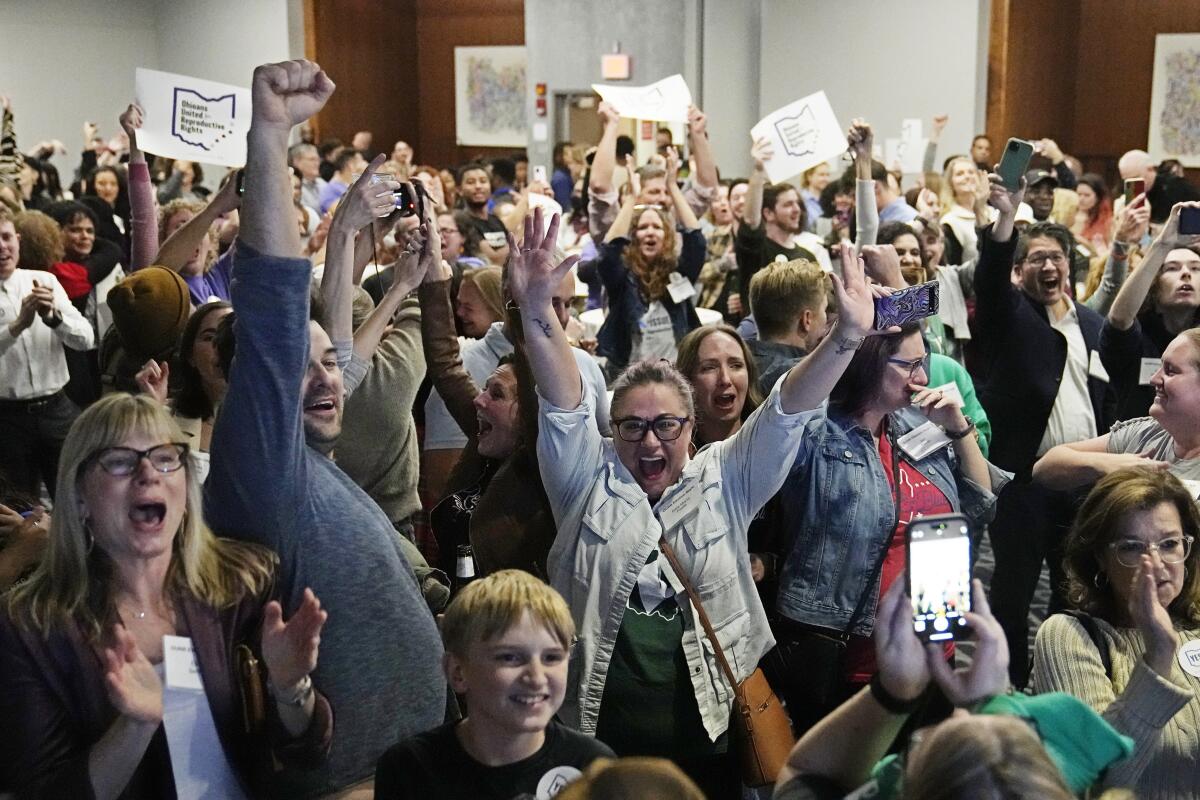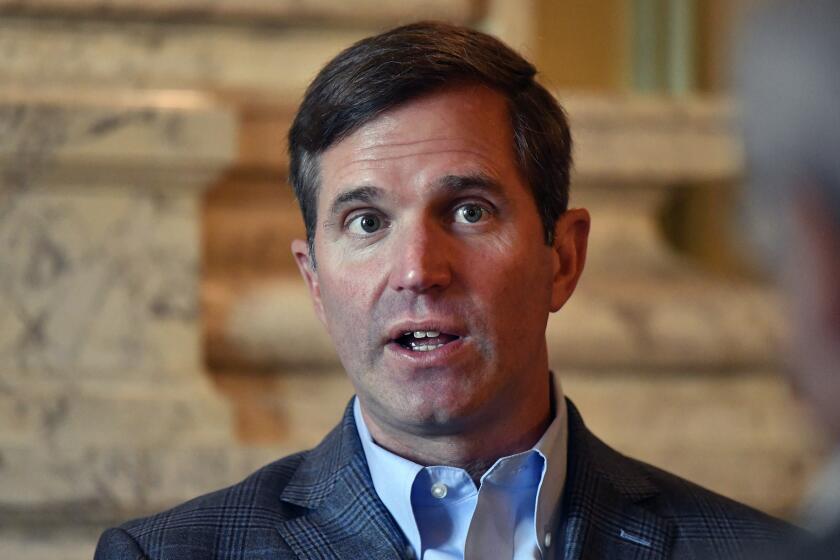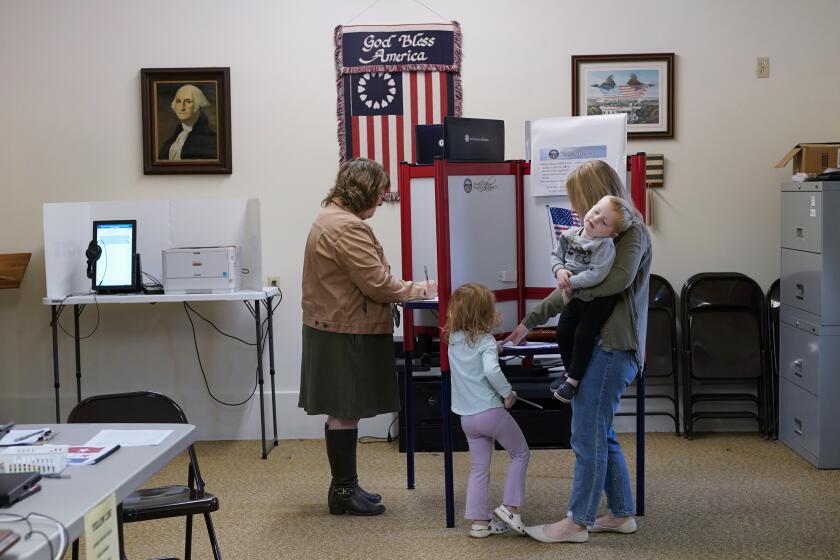Column: Why Ohio’s abortion vote should scare California

Ohio came through for abortion rights supporters Tuesday night. And though to most like-minded Californians it was a distant victory on an already-decided issue in the Golden State, it’s still a hopeful sign of sanity on the national front.
Right?
Unfortunately, I am here to tell you why the Ohio vote should cause you consternation, if not outright fear — and what you can do about that, starting with demanding that those vying to be California’s next governor in 2026 provide a strategy for protecting abortion access in the state.
Because that access is far less certain than many like to think. A loss for anti-choice proponents in Ohio is just fuel for the larger goal of federal action to make abortion illegal everywhere, or so difficult to access that it might as well be illegal. That means in California, too.
Mary Ziegler, a law professor at UC Davis who specializes in reproductive rights, points out how many people, especially in California, were caught off guard two years ago when the Supreme Court handed down the Dobbs decision, which took away any federal abortion protections.
“The unthinkable becomes the possible quite quickly in this space,” she said.
Even after that blow, Ziegler said, most Californians still don’t see abortion as a voting issue because there are no viable candidates, even Republicans, who don’t support access here. So most believe, “who you vote for in California at the state and federal level doesn’t matter when it comes to abortion, and you can prioritize other issues,” she said.
“That is wrong.”
Fresh off his reelection victory in Republican-leaning Kentucky, Democratic Gov. Andy Beshear says his party can overcome deep political divisions in U.S.
As Vice President Kamala Harris said after the Ohio results came out, “extremists are pushing for a national abortion ban that would criminalize reproductive healthcare in every single state in our Nation.”
It is true that American voters across party, race and even gender lines are making it clear, even in dripping red states like Ohio, that they support access to abortion.
One recent poll found that about 8 in 10 Americans believe decisions about an abortion should be left to a woman and her doctor. And in Ohio, it wasn’t just Democratic women who turned out. Men, Republican college-educated women, independent voters — abortion access proved itself once again to be a uniting issue.
But it is equally true that those who oppose abortion are working to circumvent the will of voters. Even though they are a minority, led by white evangelicals to a large extent, it is a politically powerful, well-funded and savvy effort that isn’t particularly respectful of democracy.
Led by organizations including the influential Heritage Foundation, they have plans in play that would take decisions on abortions to the federal level — through a national ban, through courts or through presidential executive authority — and out of the hands of pesky electorates, like staunchly blue California voters.
Those who follow the slow decline of reproductive freedoms in America warn of three ways Californians could wind up without the reproductive healthcare access we take for granted.
The most obvious is a ban imposed by Congress. The new speaker of the House, Mike Johnson, spent eight years working for the ultra-conservative legal group Alliance Defending Freedom, helping to close abortion clinics and curtail reproductive rights. The ADF was behind the Dobbs case, and as a legislator Johnson has three times introduced bills that would ban abortion nationally.
With just a few more votes, a fourth attempt might actually pass.
“What worries me is that in spite of the will of the people in this country, we are one poor election outcome away from the risk of a nationwide abortion ban,” Shannon Olivieri Hovis, the California director of Reproductive Freedom for All (formerly NARAL), told me Wednesday.
But if Congress can’t deliver for white evangelicals, Trump could. Ziegler warns that if elected to another term, which polls seem to indicate is a possibility, “Trump can on his own do a lot to limit abortion access in states like California.”
She pointed to the Comstock Act, a 150-year-old morals law.
She said there is a conservative push to interpret the Comstock Act as already providing a national abortion ban by preventing any item meant for use in an abortion to be mailed. That would cover not just medication but any item used in a surgical abortion, such as gloves or scalpels.
The use of the Comstock Act to ban medication abortion is already being argued in court. But Ziegler said Trump could have a Republican Department of Justice launch prosecutions that would push the issue to his handpicked Supreme Court.
“Basically they are saying there is already a ban on abortion and all they need is a President Trump to enforce it and the Supreme Court to uphold it,” she said.
But even if President Biden wins another term and Democrats keep the Senate, abortion access is far from safe. There are currently multiple federal court cases that could make it much harder, even in California, to access abortion.
And there are state efforts that are attempting not just to criminalize women seeking abortions but to make it illegal to help anyone obtain one, from driving them to the bus stop to being a medical provider in another state performing that abortion.
“Yes, we are winning elections but we are still living in a world where our judicial system no longer upholds the norms it was built upon,” Sue Dunlap, the president and chief executive of Planned Parenthood Los Angeles, told me.
Dunlap said that since Roe vs. Wade was overturned, her organization has seen a 22% increase in patients seeking abortion care. She suspects that many of those patients are coming from out of state — places that have bans in effect — but also knows that many patients are too scared to admit that because of those new laws.
One recent patient from Texas refused to have any blood work done prior to traveling to California because she feared it could provide a record of her pregnancy, Dunlap said. Counties in Texas are passing local ordinances against “abortion trafficking,” which covers helping someone obtain a procedure, whether providing funds or giving a ride.
Texas isn’t alone in those types of terror-inducing laws. Idaho and other states are passing them, and Dunlap said she expects more states to follow, and more court cases trying novel tactics to either outlaw abortions or scare people away from seeking or providing them.
“We literally as abortion providers have to have multiple layers of plans to be ready for what surprise [court] decisions will come,” she said.
What could these victories mean for President Biden’s reelection?
Which brings us back to California. We currently have a governor and a Legislature that haven’t just been pro-abortion rights but have actively been working to make our laws stronger to ensure not only that Californians can access abortion but that those traveling here and those providing services to non-Californians are protected.
We have allocated $20 million in our state budget to help ensure abortion access and even aid those who need to travel, and an additional $40 million to pay back providers who perform low- or no-cost services. Gov. Gavin Newsom has stockpiled 250,000 misoprostol pills, an abortion medication, in case the judiciary outlaws it.
Newsom has taken a national role in bringing together other governors and highlighting California’s position across the country. As much as his national spotlighting has annoyed many, his outspokenness on this issue is “making governors not just their own little island, but groups that can work together,” Ziegler said.
She said the next governor should be asked how they are going to be a regional and national leader on abortion access, and I agree.
Though it seems far away, candidates for the next gubernatorial race are already lining up. Lt. Gov. Eleni Kounalakis and state Supt. of Public Instruction Tony Thurmond have already declared. Atty. Gen. Rob Bonta is rumored to be strongly considering a run.
We should be asking all of them how they would protect Californians if medication abortion is outlawed. How will they protect us if there is a national ban? What are they going to do to fight back against this creeping authoritarianism that will pick off our civil rights one by one if we allow it?
Support for abortion rights is the bare minimum.
Abortion access is now a voting issue in California, and we need to be certain our next leader is ready to fight.
More to Read
Sign up for Essential California
The most important California stories and recommendations in your inbox every morning.
You may occasionally receive promotional content from the Los Angeles Times.













